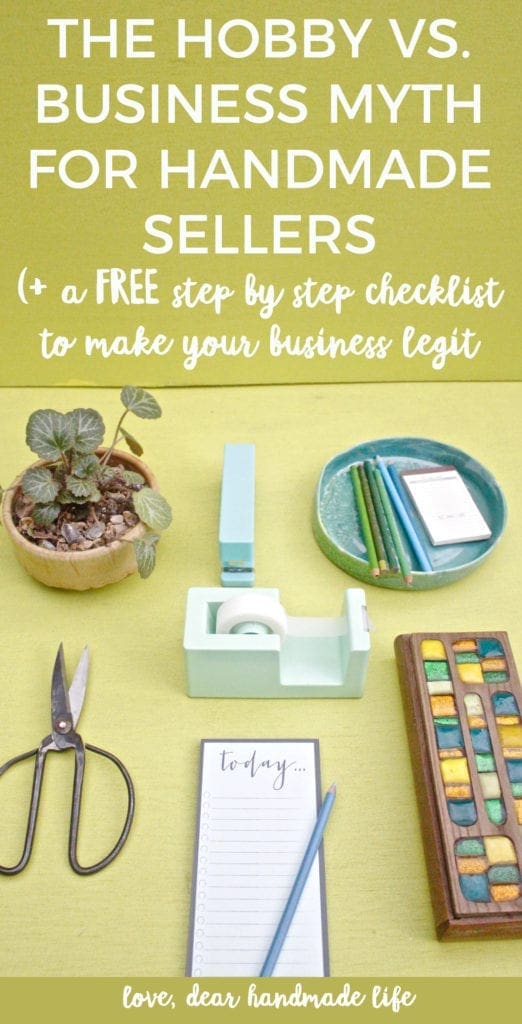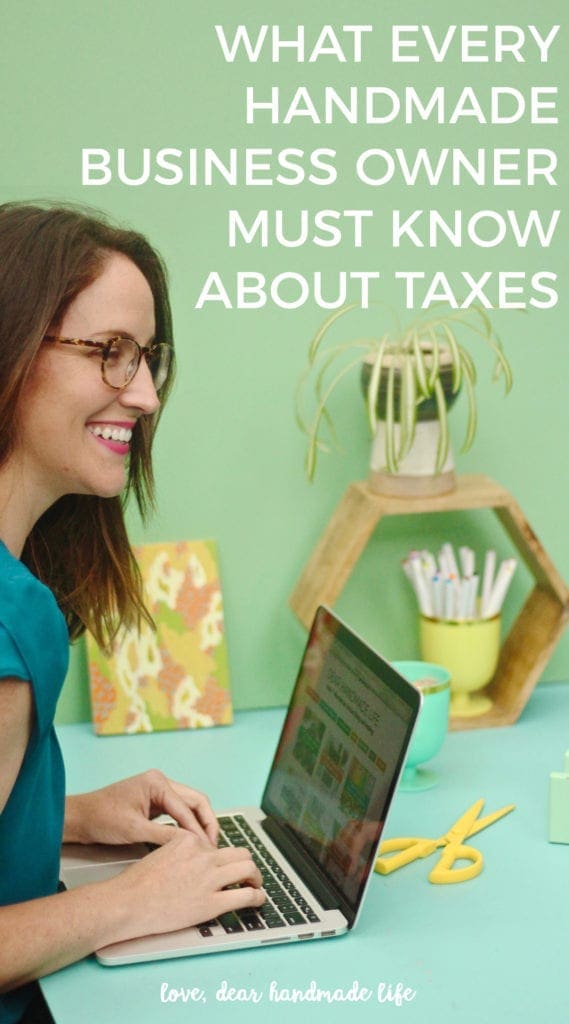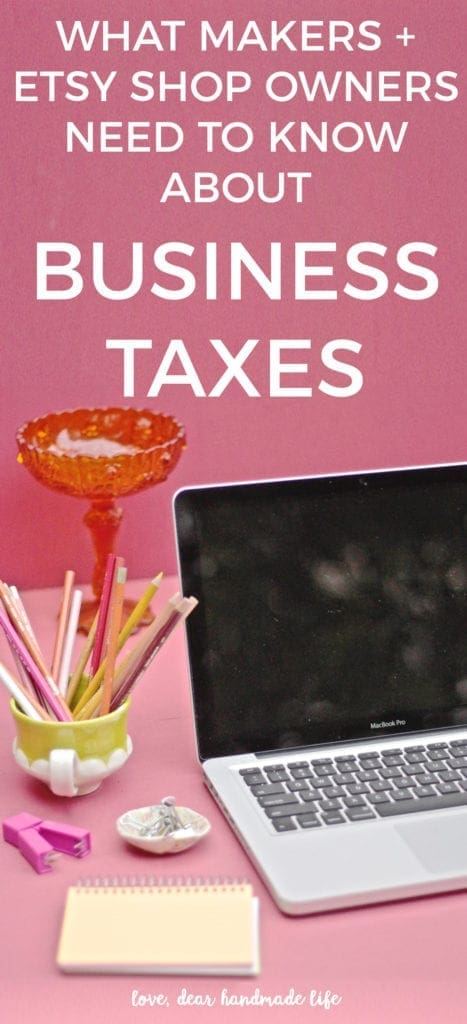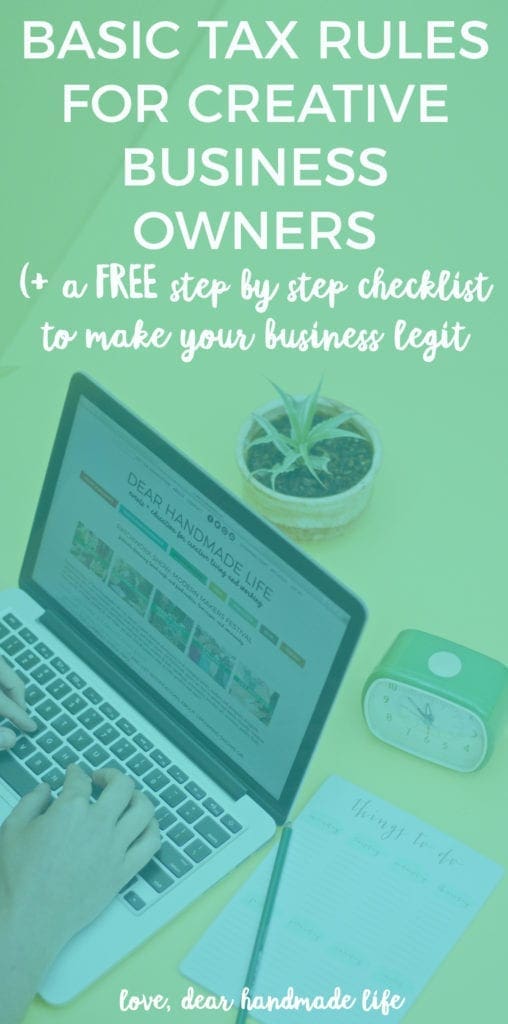The Hobby vs. Business Myth for Handmade Sellers
Editor’s note: We’re excited to welcome Janet LeBlanc (an accountant and the founder of Paper + Spark) to the Dear Handmade Life blog. Check out Janet’s other posts: Income and Sales Tax Guide for Makers and Why Your Business Needs its own Bank Account + her FREE downloadable one page banking cheat sheet. She also has a great FREE downloadable checklist with all the info you need to set-up the financial side of your business. -Nicole S.
When you make the decision to start selling your handmade goods, becoming a business owner seems so exciting. I’m an entrepreneur now! Let’s design a logo, experiment with color schemes, test out different product lines, play with product photography…register for taxes? Wait, do I have to do that?
There’s this rumor that likes to make it’s way around the internet that your handmade shop can be considered “just” a hobby and you don’t need to worry about taxes yet. You might see this rumor stated like:
You don’t need to report your sales until you make $X.
I just consider what I do a hobby, so I don’t need to register as a business.
My shop is just a hobby right now because I’m not making a profit yet.
I only made $X in sales, so I don’t have to claim them.
I hate to be a Debbie Downer, but this is generally not true.
First, if your shop truly is considered a “hobby” (as defined by the IRS) then you still have to report your sales for federal income tax purposes. There’s no way around it.
Second, and more importantly, your shop is probably not a hobby anyway. It’s most likely a real, full-fledged business.
It’s not about minimum sales; it’s about intent.
In the words of everyone’s favorite regulatory body, the Internal Revenue Service, “Generally, an activity qualifies as a business if it is carried on with the reasonable expectation of earning a profit.” You can read all about the IRS definition of a hobby (or a “not-for-profit activity”) right here. It all basically boils down to intent.
Did you start selling handmade goods with the intent of making a profit? If the answer is yes, then welcome to the club – you are a business!
It doesn’t matter if you aren’t currently making a profit.
It doesn’t matter if you only made $399 in sales.
It doesn’t matter if you haven’t “registered as a business” with your state.
You’re a business.
So next time you see that rumor in a Facebook group, I encourage you to shed some light. Let them know that there are no invisible minimum thresholds to “becoming” a business. An intent to make a profit (even if no profit is made!) means you are a business.
Both hobbies and businesses are subject to federal income tax.
The main difference between whether your shop is a hobby or a business is how it’s taxed, but the key to remember is that both are taxed.
Hobby (or “activity not for profit”) sales are generally reported on your personal tax return, the Form 1040, on line 21 as “other income”. Deductions for expenses related to your hobby activity may be limited. That means it is possible you will be taxed on your total gross sales. You can only reduce your hobby sales by any related expenses if you itemize your personal deductions, which many taxpayers do not do. You also cannot claim a loss for a hobby (where your expenses are greater than your sales).
On the other hand, a business gets its own tax form – most likely the Schedule C if you’re a sole proprietor. A business reports its total gross sales and then reduces them by all its qualified expenses or deductions. You are then taxed on the resulting net income. A business is also allowed to have a loss.
It’s worth mentioning here that there is a minimum threshold for self-employment tax, which applies only to businesses, and that’s a net income of $400 or more. This is why a lot of times you’ll hear the rumor that you don’t have to claim your sales until you “net $400”. That’s still not correct, since it only applies to self-employment tax specifically, not federal income tax.
So what does this mean for me?
My first point is that regardless of whether you’re a hobby or a business, you’ve got tax responsibilities. We cannot use the “hobby excuse” to get out of doing paperwork, bookkeeping, or taxes unfortunately. Don’t fall into the trap of thinking you don’t need to report your sales (or deal with taxes) until X happens.
My second point is that it’s generally more beneficial to file as a business anyway (assuming you are a business, of course!). This is because businesses can reduce sales by deductions, and they can also claim a net loss (which can reduce your personal tax liability). Hobbies are more likely to be taxed on their gross sales.
This is an explanation of your business tax requirements in a teeny, tiny super summarized nutshell. If you want more help learning about your financial responsibilities as a business owner, grab this free step-by-step checklist on getting legit here.
Next time you see someone ask a question about this on an Etsy forum or in your favorite Facebook group, I encourage you to share this post! A rising tide lifts all ships. When more handmade sellers feel clear and confident about their tax responsibilities, it is better for all of us (and there will be less confusion and misinformation floating around out there!).
-JANET LEBLANC
ABOUT THE AUTHOR:
Janet is the founder of Paper + Spark, where she offers educational content, tools & spreadsheet templates to help makers and creative become more confident about the financial side of running their business. She’s a maker, Etsy shop owner, and an accountant. Her passion is to help other creative women bring their entrepreneurial dreams to life by going from confused to capable when it comes to their money. Visit her at paperandspark.com.






Thank you, I have been sewing for family members for 40+ years, just recently purchased an industrial sewing machine and sell bags and wallets. This information is very helpful, I know I am on the right track I opened a DBA account on 12-31-19. So I could started the year out right.